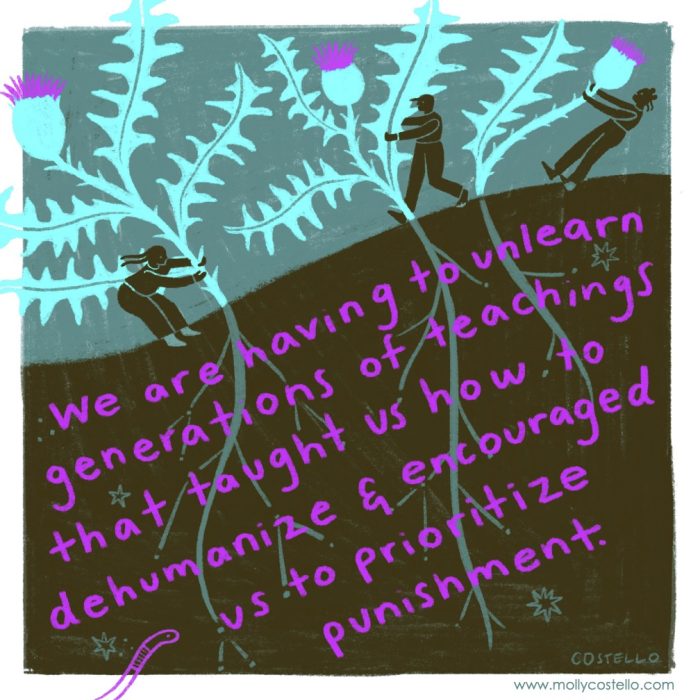Education & Leadership Development
Our movements for freedom thrive when we share and develop knowledge together. We learn from what we have in common, and we learn just as much from our differences. We value deep collective study, and we honor what we have observed and experienced ourselves. This empowers members to contribute effectively to the development of their enterprises/organizations, and to inform the general public (particularly young people and opinion leaders) about the nature and benefits of solidarity and cooperation. We also know that our movements are more resilient and powerful when we are leaderful, instead of dependent on a small number of overworked and burned out individuals. To get there we have to prioritize developing leadership within our organizations and across our movement.
PRINCIPLE: We commit to the ongoing education of ourselves and our members following International Cooperative Principle #5 - Member Education.
Practices
- PRACTICE: Learn how to best label and contextualize your work. Cooperatives are well known and there is a tendency for everything SE to get labeled as a co-op, but that diminishes the unique contributions of organizing that does not fall under a co-operative label. Groups engaged in SE work should consider carefully which label to apply to their work by learning about co-operatives and their unique rights and responsibilities (including legal formations and traditions) and learning about or exploring the history of collectives. If you are in a group that is democratic, but does not adhere to the Co-op Principles and Values and is not incorporated as a co-op, consider what you need to do to move your group towards actually becoming a co-op. If you do not wish to be a co-op, consider the potential harm claiming the identity causes and be aware of the legal liability you face in some states for applying that term to your work.
- PRACTICE: Educational activities should happen regularly within every SE entity. Promulgate clear principles & revisit/revise periodically. This should include political education as well as ongoing training in all aspects of the work you are doing together.
- PRACTICE: Education should always be integrated into our networking and organizing since it is about transforming our understanding and capacities for collective & cooperative action.
PRINCIPLE: We value collective learning to examine, adapt, and improve in response to challenges, opposition and new ideas.
Practices
- PRACTICE: Convene regular member meetings and informational forums to discuss and debate issues arising in our organizations.
- PRACTICE: Share research, data and educational materials freely within our networks.
PRINCIPLE: We democratize educational practices. Everyone is a learner and everyone is a teacher.
Practices
- PRACTICE: Use context specific popular/participatory education methods. There are many traditions to learn from but the most common in the US is based on Paulo Freirehttps://www.freire.org/concepts-used-by-paulo-freire.
- PRACTICE: Prioritize peer support and education, utilizing the knowledge/expertise of practitioners.
- PRACTICE: Use study groups as a way to learn new things together and build relationships.
- PRACTICE: Develop a shared definition about this work – not necessarily using the same words, but being clear about what is SE vs what is something else. This should be debated at all levels and renewed on a regular basis.
- PRACTICE: Support democratic schools that include students in decision-making and explicitly move away from punitive models that insist on rote learning and rely on grading.
PRINCIPLE: We continually build new leadership within our organizations.
Practices
- PRACTICE: Utilize ladders of engagement, which are ways to specifically tier learning that allow people to take on more leadership and responsibility as they gain a deeper understanding of the work.
- PRACTICE: Commit to ongoing leadership development and succession planning for all management, board, committee and leadership roles.
- PRACTICE: Develop and support mentorship programs within and among organizations.
- PRACTICE: Invest in training and support to develop democratic self-management practices. These are learned skills that allow us to respect ourselves as adults who can be trusted, rather than the paternalistic view of workers as lazy children who must be supervised for their own good. For examples of self-management practices, check out Reinventing Organizations by Frederic Laloux. Structures like regular peer reviews to provide feedback, checking in on tasks as a core part of group meetings, creating clear policies for what to do when somebody isn’t meeting group expectations, and having a shared project management system can all support self-management. You can find more examples in the Nonprofit Democracy Network’s google drive.
